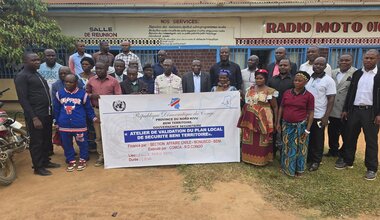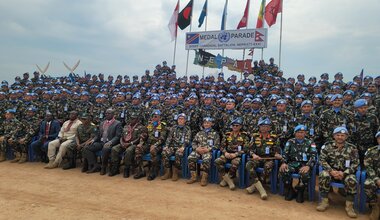MONUSCO applauds DRC Government’s efforts to fight torture, especially through reinforcing the related legal framework
Kinshasa, 26 June 2016 – On the occasion of the commemoration of the International Day in Support of Victims of Torture, this 26 June 2016, the United Nations Joint Human Rights Office in collaboration with the Ministry of Justice and Human Rights, the National Human Rights Commission and Human Rights NGOs, organized in Kinshasa and across the country, a number of activities: training, sensitization, advocacy and dissemination in favor of different target groups.
The aims of the above initiatives are to remind all the Congolese people the absolute nature of the prohibition of torture: whether in time of war or threat of war, of internal political instability or any other state of emergency or in relation to national security, no circumstance whatsoever shall be invoked to justify the use of torture or any other form of punishment or cruel, inhuman or degrading treatment. Furthermore, the initiatives aim to raise awareness of the defense and security forces, judiciary authorities and civil society organizations on the content of the law, and to see to its effective implementation as well as to reaffirm Government and the entire national and international communities’ legal obligation, to give appropriate support to the victims of this scourge.
“MONUSCO hails DRC Government’s efforts to combat torture, especially through reinforcing the related legal framework and disseminating it across the DRC; I reiterate the United Nations’ commitment to continue to support such efforts, as well as those who have been advocating for support and reparations to the victims”, said the Special Representative of the United Nations Secretary General in DRC, Maman Sidikou. For his part, Jose Maria Aranaz, Director of the United Nations Joint Human Rights Office (BCNUDH) is persuaded that a systematic opening of thorough investigations – for which we stand prepared to support authorities – and effective prosecution of the presumed perpetrator of acts of torture, may play a deterrent role on other potential perpetrators and contribute to eradicating most serious acts.
Note to publishers
In over two weeks, the Democratic Republic of the Congo (DRC) will celebrate the fifth anniversary of the law on the criminalization of torture.
Since 9 July 2011, torture, prohibited in the Congolese Constitution, has not only been criminalized in the Congolese domestic law but heavy punishment has also been attached to it. In its five-year existence, this legislation has been instrumental in having many civil servants and members of armed groups sentenced to jail for committing acts of torture.
This year, DRC will also be celebrating 20 years of its accession to the Convention against torture and other forms of punishments or cruel, inhuman or degrading treatment which, it ratified on 18 March 1996.
 UN
UN United Nations Peacekeeping
United Nations Peacekeeping






